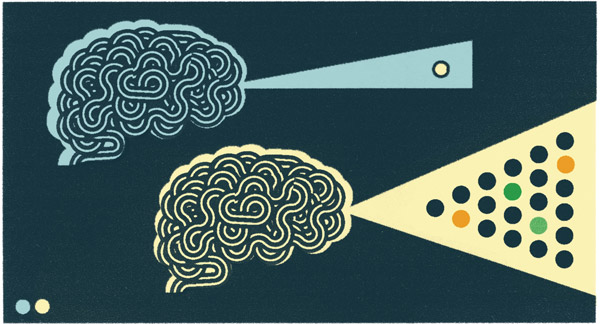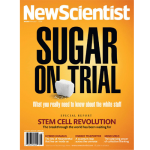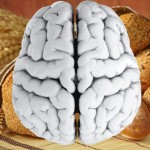Older Brain Really May Be a Wiser Brain

When older people can no longer remember names at a cocktail party, they tend to think that their brainpower is declining. But a growing number of studies suggest that this assumption is often wrong. Instead, the research finds, the aging brain is simply taking in more data and trying to sift through a clutter of information, often to its long-term benefit.
The studies are analyzed in a new edition of a neurology book, “Progress in Brain Research.”
Some brains do deteriorate with age. Alzheimer’s disease, for example, strikes 13 percent of Americans 65 and older. But for most aging adults, the authors say, much of what occurs is a gradually widening focus of attention that makes it more difficult to latch onto just one fact, like a name or a telephone number. Although that can be frustrating, it is often useful.
“It may be that distractibility is not, in fact, a bad thing,” said Shelley H. Carson, apsychology researcher at Harvard whose work was cited in the book. “It may increase the amount of information available to the conscious mind.”
For example, in studies where subjects are asked to read passages that are interrupted with unexpected words or phrases, adults 60 and older work much more slowly than college students. Although the students plow through the texts at a consistent speed regardless of what the out-of-place words mean, older people slow down even more when the words are related to the topic at hand. That indicates that they are not just stumbling over the extra information, but are taking it in and processing it.
When both groups were later asked questions for which the out-of-place words might be answers, the older adults responded much better than the students.
“For the young people, it’s as if the distraction never happened,” said an author of the review, Lynn Hasher, a professor of psychology at the University of Toronto and a senior scientist at the Rotman Research Institute. “But for older adults, because they’ve retained all this extra data, they’re now suddenly the better problem solvers. They can transfer the information they’ve soaked up from one situation to another.”
Such tendencies can yield big advantages in the real world, where it is not always clear what information is important, or will become important. A seemingly irrelevant point or suggestion in a memo can take on new meaning if the original plan changes. Or extra details that stole your attention, like others’ yawning and fidgeting, may help you assess the speaker’s real impact.
“A broad attention span may enable older adults to ultimately know more about a situation and the indirect message of what’s going on than their younger peers,” Dr. Hasher said. “We believe that this characteristic may play a significant role in why we think of older people as wiser.”
In a 2003 study at Harvard, Dr. Carson and other researchers tested students’ ability to tune out irrelevant information when exposed to a barrage of stimuli. The more creative the students were thought to be, determined by a questionnaire on past achievements, the more trouble they had ignoring the unwanted data. A reduced ability to filter and set priorities, the scientists concluded, could contribute to original thinking.
This phenomenon, Dr. Carson said, is often linked to a decreased activity in the prefrontal cortex. Studies have found that people who suffered an injury or disease that lowered activity in that region became more interested in creative pursuits.
Jacqui Smith, a professor of psychology and research professor at the Institute for Social Research at the University of Michigan, who was not involved in the current research, said there was a word for what results when the mind is able to assimilate data and put it in its proper place — wisdom.
“These findings are all very consistent with the context we’re building for what wisdom is,” she said. “If older people are taking in more information from a situation, and they’re then able to combine it with their comparatively greater store of general knowledge, they’re going to have a nice advantage.”



